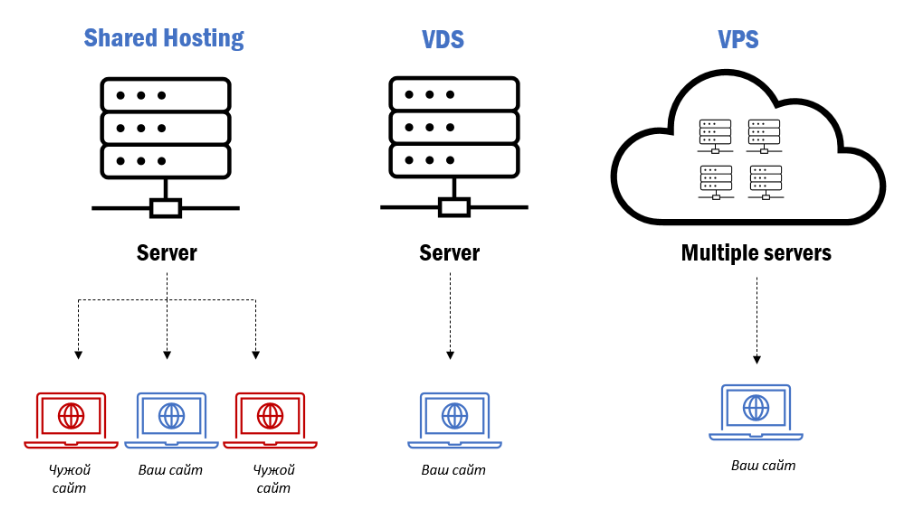VPS server: virtual dedicated server for your tasks
What is a VPS server?
Internet technologies are developing. The number of services that can be ordered and received remotely is growing, the number of sites is increasing, their design is becoming more unusual, functional, and understandable. Sites, as we know, are hosted on hostings and servers that are also not standing still.
One of the most modern technologies is VPS servers, without which it is now impossible to imagine the Internet space. Their main advantage is a combination of the strengths of physical and virtual systems. What other advantages are characterized by such solutions? What are their features? Where are they used?
General concept
As stated at the beginning, the emergence of VPS is associated with the general development of the Internet environment. Several years ago, the classic scheme for hosting a network resource was to use a physical server located in the provider's data center or even directly on the premises of the company that owned the site.
The next step is virtual hosting, which involves hosting multiple network resources within a single server, using the hardware capacity and performance of a common device.
Finally, the third stage is VPS, which stands for “virtual private server”. From a technical point of view, they are virtual machines running on physical hardware capacity owned by the provider. The solutions are productive, easy to manage, functional, and generally look optimal, regardless of the specifics and scale of the site being hosted!
Comparison with VDS
Some experts argue that the concepts of “virtual private server” and “virtual dedicated server” are completely synonymous, while others still highlight certain differences. It is worth concentrating on the second point of view, getting acquainted with the interpretations of both concepts:
- VPS servers. These are analogs of dedicated physical servers, but operating in a virtual environment. Like physical systems, they are equipped with a full set of hardware components, high-performance CPUs, RAM, and capacious storage devices. All these resources are available to the user, open up wide customization options, allow you to store huge amounts of information, host “heavy” sites, including online stores, streaming services.
- VDS. The main difference that some experts emphasize is the availability of resources not to a specific client, but their division among a whole group.

Specifics of use
A VPS server is suitable for solving the following tasks:
- Hosting websites. Their specification is secondary. It is possible to host both small business card websites and more serious network resources, news portals, ad sites, online stores with huge, regularly updated catalogs.
- Software development, its testing. Within the VPS, numerous specialists participating in the process can interact, while their geographic location is secondary. The servers are characterized by flexible settings, allow storing large amounts of data, and roll back to the normal state of the program if development errors or erroneous actions are made.
- Launching a game server. VPS technology allows you to use any programs, including those aimed at game servers.
- Launching a mail server. VPS allows you to effectively interact with any clients for receiving and sending emails, from classic Microsoft Outlook to third-party developments. This approach is as efficient and convenient as possible, while being safe, ensuring data confidentiality, eliminating the risk of it falling into the hands of third parties.
- Setting up information storage. A VPS server can be turned into a huge cloud storage, access to which has no geographical restrictions.
Advantages
The main advantages of VPS servers are as follows:
- Flexibility of management. The volume of resources used strictly corresponds to actual needs. If necessary, it can be reduced or increased. This eliminates unnecessary expenses and optimizes costs.
- Security. The virtual server is reliably isolated, access rights to the stored data are strictly delimited, which eliminates outside interference, theft or intentional damage to information. This advantage is guaranteed by the “hypervisor” type structure, in which logging in from a neighboring virtual resource is technically impossible. Protection against hacker attacks, such as DDoS, is provided. The user has access not only to built-in protective tools and algorithms, but also, if necessary, can install their own anti-virus applications and other software.
- Ease of administration. The client fully controls the work of the dedicated server and can adjust it at the first need.
- Low price. A virtual server, with similar functionality, is noticeably cheaper than a physical one. Its use will be affordable even for small developing enterprises that cannot afford to buy and maintain their own hardware.
- Reliability. To fully appreciate this advantage, you need to take a responsible approach to choosing a provider providing the service. Organizations that care about their reputation equip servers with hardware components from reputable brands, adapted to uninterrupted long-term operation, resistant to failures and failures. In addition, such a provider has qualified specialists on staff who are ready to fix any breakdowns, both hardware and software, at the first need.
Recommendations for selection
Efficient use of a VPS server is possible only if it was chosen correctly and meets the set tasks from all sides. It is necessary to consider all the most important factors.
Management specifics
There are two main schemes available here:
- Managed server, under the “supervision” of the provider.
- Unmanaged server, controlled exclusively by the user.

Professionals who want to change all the settings themselves are better off choosing the second scheme. You can’t count on the provider’s help in such a situation, you will have to eliminate the consequences of failures yourself, install the necessary software, but the variability and accuracy are maximum.
The managed scheme is an option for most users. The settings are available, however, if problems arise, you won’t have to be left alone with them, the provider’s technical support service will help you fix them.
Operating system
Linux or Windows. The first one is free, however, the second one is simpler and more familiar to most users. You need to immediately consider what programs, services and tools will be used on the server, make sure that they exist in an edition for a specific operating system.

Hardware configuration
The server performance should be sufficient to confidently solve the designated tasks, correspond to the specifics of the application, be it server placement or cloud storage setup. The recommended parameters are as follows:
- RAM. A single-page website will need 1 gigabyte, an online store - from 8 to 16, depending on the scale, a large corporate project - at least 24.
- Processor. First of all, you need to focus on the number of cores. A small project will need a couple of 2 gigahertz cores, a large one will need 5 or even 10 times more.
- Disk storage capacity. The main guideline is the amount of stored information. It is better if the server is equipped with high-performance solid-state drives that support high-speed data exchange. The fastest drives operate with an NVMe interface, the throughput of which is higher than that of classic SATA.
Reliability
The minimum acceptable rate is 99.95%, but 99.9 is better.
Redundancy
The server's potential capabilities must exceed current requests. This will allow for upgrades if necessary and increases the overall level of fault tolerance.
Technical support
Its quality depends on the provider, the organization providing the service. It is not worth dealing with companies that are not ready to resolve customer issues in an uninterrupted mode, around the clock, regardless of weekends and holidays. Even short-term unavailability of the site is serious commercial troubles, lost customers, a damaged reputation.
Geographical location
The closer the actual location of the VPS server to the audience it serves, the better. Following this recommendation increases access speed and improves the position of the network resource in search results lists.
Additional IP addresses
Auxiliary addresses are relevant in the following situations:
- Installing and using SSL certificates.
- The need to assign personal addresses to all sites, applications, services.
- The need to assign several addresses to one network resource, which has, for example, subdomains with different geographic references.
Secondary functions
The most useful of the additional ones are the following features:
- Ready-to-use, default solutions that correspond to the specifics of server use. For example, it can be immediately adapted for online games, equipped with 1C, which is important for entrepreneurs.
- Support for high-reliability antivirus software that protects even from professional hackers.
- Insurance against various risks, such as failures, data loss.
Summing up
The capabilities of virtual hosting are sufficient only for small Internet projects. It does not allow you to change the initial configuration, software and hardware, change the operating system, fully interact with files, manage the site, or host several projects.

A VPS server is a much more reliable, modern solution that meets the needs of even large-scale projects, allowing you to solve the most serious problems, regardless of their specifics. The main thing is to choose the right configuration and provider!
Answers to popular questions
How soon can I start using the service?
The user account is opened immediately after the application is submitted.
Immediately after making the payment, you can start using the service immediately.